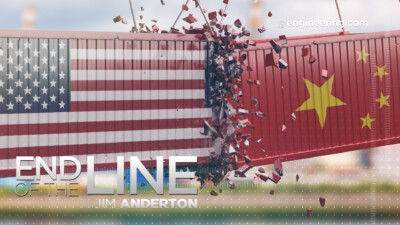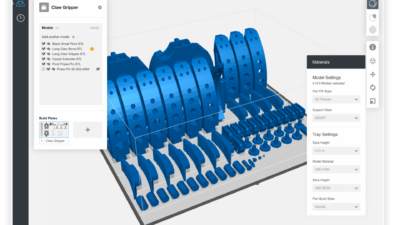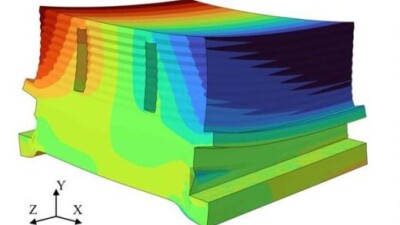Joe Biden and Big Manufacturing want to help smaller engineering companies. Will it work?
An interesting consortium of U.S. federal government departments, agencies and top manufacturing companies has announced a program designed to rebuild broken supply chains from the inside out with a domestic SME base. AM Forward, administered by the non-profit Applied Science and Technology Research Organization of America, is a commitment by major companies to help small and medium-sized suppliers adopt additive manufacturing technology, with a combination of purchase commitments, training and technology transfer. The program is ambitious, and if it works, could create a new Renaissance in American manufacturing. But if the program runs like government programs often do, it could founder. Jim Anderton comments.
Access all episodes of End of the Line on engineering.com TV along with all of our other series.
Transcript of this week’s show:
To see any graphs, charts, graphics, images, and/or videos to which the transcript may be referring, watch the above video.
Ronald Reagan was one of the most quotable presidents in history, and on August 12th, 1986, he famously said that the nine most terrifying words in English language were, “I’m from the government, and I’m here to help.”
To be sure, it was a much simpler time. A time when the threat to American manufacturing jobs came primarily from Japan, and much of the conventional supply chain still existed domestically. But only six years previously, the federal government bailed out Chrysler with a 1.5 billion dollar loan, and the entire U.S. auto industry was on the brink.
Long before the end of Reagan’s term, it was clear that the major manufacturing industries such as automotive, aerospace and energy operated in a mixed economy, driven by both market forces and government incentives. Today, Washington throwing money at favoured industries is commonplace. But there is a new program that is an interesting combination of major manufacturer association and Federal agencies called AM Forward.
On paper it looks very, very different—in a good way. Administered by the non-profit Applied Science and Research Technology Organization of America, AM Forward is conceptually very simple. Large manufacturing firms—companies that have a very large and diverse supplier base, often in Asia—agree to purchase 3D printed components and assemblies from American suppliers, and back up that commitment with technology transfer and just as importantly, unified standards and certifications. Washington also kicks in cash and technical assistance from a wide range of departments and agencies, from the Department of Agriculture to the National Institute of Standards and Technology.
AM Forward is open to any OEM manufacturer and the founding members are truly heavyweights: GE Aviation, Raytheon, Honeywell, Siemens Energy and Lockheed Martin. That’s a strong offensive line, one you can definitely build a team around.
It sounds like a Tier 1 or Tier 2 supplier’s dream: guaranteed orders, a cooperative customer, unified standards, technology transfer, funding for capex and even workforce training. Where do I sign up, right?
Well, the essence of that famous quote from Reagan is that government is not evil—in fact, its intentions are good. But somewhere between intentions and execution, a strange phenomenon happens: Bureaucracy.
This is taxpayer money we’re talking about, and in an effort to make sure that it’s well spent, intake screening and testing emerges, with application forms, processes and meetings. Then programs establish systems to make sure that the money is well spent after it is granted, with more forms, checks and meetings. How much paperwork and administration time will be necessary to manage the new apprenticeship and training programs, and the new standards and certifications?
The dirty secret is that the reason why large corporations benefit the most from government programs and public-private partnerships is that they can afford to invest in the human capital necessary to run the gauntlet that makes up most government agencies and departments. It isn’t favouritism, it’s risk.
The simple reality is, small and medium-size manufacturers would have to be smoking crack before they would literally bet their company on the new equipment and capability needed to win high-technology business from huge multinational customers in areas like aerospace and energy. But as those industry majors increasingly demand parts and assemblies that are too complex to machine or fabricate without AM, and demand expensive and complex materials, quality processes, plus IP and DoD security guarantees, we all know that fewer and fewer small and medium-size companies can bid on those lucrative contracts.
They want to, and they’ve told me this, but the simple fact is that they have to be risk averse to protect the enterprise. American SMEs are not short of technical ability, and the AM Forward initiative will definitely help bring them up to speed. But both the initiative and Washington need to understand that programs need to be simple and easy to administer, or they will not achieve the reshoring objective.
I have a simple suggestion: if supplier companies need to hire a consultant or lawyer to take advantage of your program, stop and rethink the program. Engineering program management is frequently about controlling unwanted growth. Growth in costs, complexity, size and weight. It’s the same with paperwork. It’s hard to control instability in a new turbofan engine combustor. It’s even harder to control bureaucracy. But, it’s essential to try.



